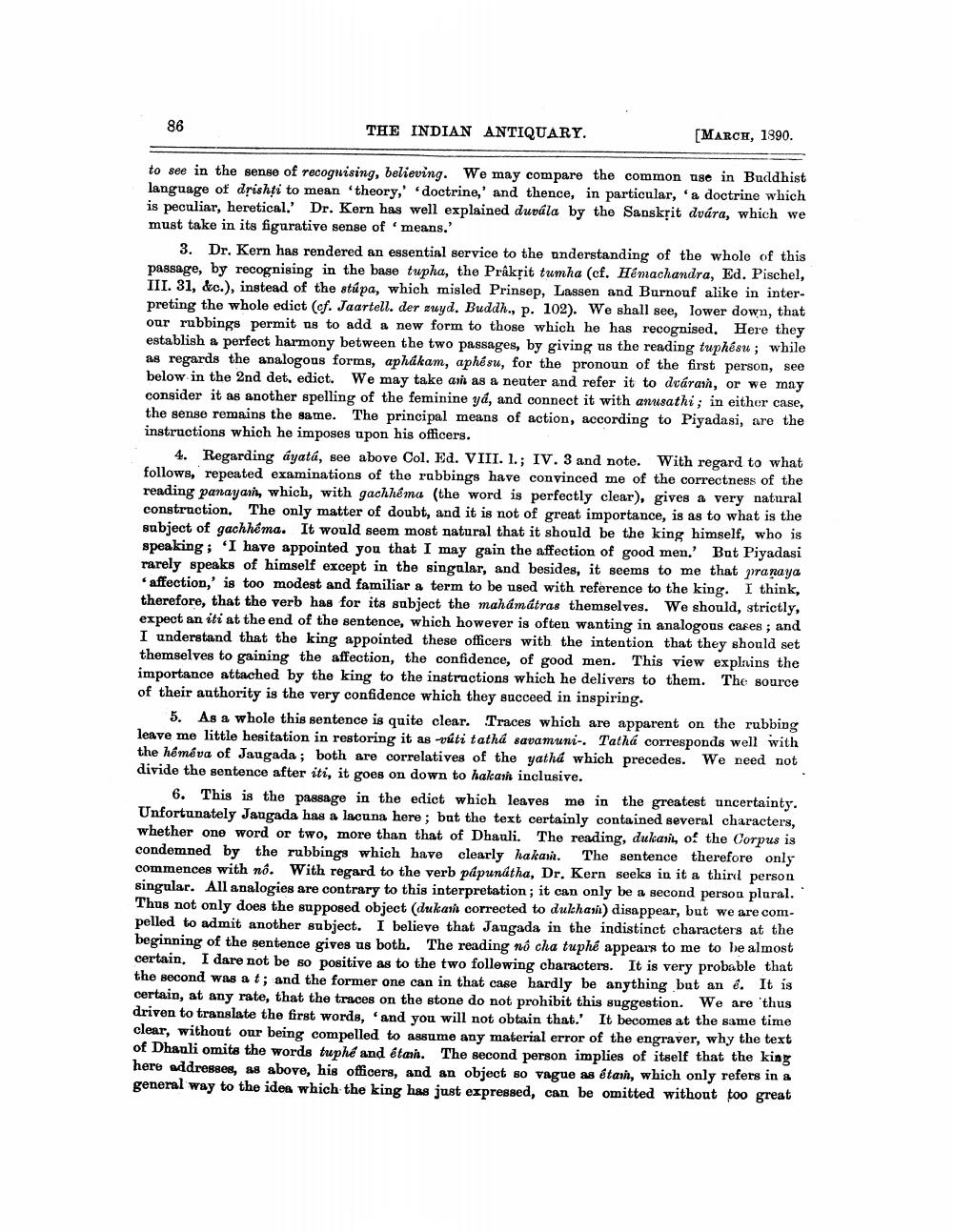________________
86
THE INDIAN ANTIQUARY.
[MARCH, 1990.
to see in the sense of recognising, believing. We may compare the common use in Buddhist language of drishți to mean theory,' doctrine,' and thence, in particular, 'a doctrine which is peculiar, heretical.' Dr. Kern has well explained duvála by the Sanskrit dvara, which we must take in its figurative sense of means.
3. Dr. Kern has rendered an essential service to the understanding of the whole of this passage, by recognising in the base tupha, the Prâksit tumha (cf. Hémachandra, Ed. Pischel, III. 31, &c.), instead of the stúpa, which misled Prinsep, Lassen and Burnouf alike in interpreting the whole edict (cf. Jaartell. der muyd. Buddh., p. 102). We shall see, lower down, that our rubbings permit ns to add a new form to those which he has recognised. Here they establish a perfect harmony between the two passages, by giving us the reading tuphêsu ; while as regards the analogous forms, aphakam, aphesu, for the pronoun of the first person, see below in the 2nd det, edict. We may take am as a neuter and refer it to dvaras, or we may consider it as another spelling of the feminine ya, and connect it with anusathi; in either case, the sense remains the same. The principal means of action, according to Piyadasi, are the instructions which he imposes upon his officers.
4. Regarding byata, see above Col. Ed. VIII. 1.; IV. 3 and note. With regard to what follows, repeated examinations of the rubbings have convinced me of the correctness of the reading panayam, which, with gachhéma (the word is perfectly clear), gives a very natural construction. The only matter of doubt, and it is not of great importance, is as to what is the subject of gachhéma. It would seem most natural that it should be the king himself, who is speaking ; 'I have appointed you that I may gain the affection of good men.' But Piyadasi rarely speaks of himself except in the singular, and besides, it seems to me that pranaya
affection,' is too modest and familiar a term to be used with reference to the king. I think, therefore, that the verb has for its subject the mahámátras themselves. We should, strictly, expect an iti at the end of the sentence, which however is often wanting in analogous cares; and I understand that the king appointed these officers with the intention that they should set themselves to gaining the affection, the confidence, of good men. This view explains the importance attached by the king to the instructions which he delivers to them. The source of their authority is the very confidence which they succeed in inspiring.
5. As a whole this sentence is quite clear. Traces which are apparent on the rubbing leave me little hesitation in restoring it as vúti tatha savamuni-. Tathá corresponds well with the héméva of Jaugada; both are correlatives of the yatha which precedes. We need not divide the sentence after iti, it goes on down to hakarh inclusive.
6. This is the passage in the edict which leaves me in the greatest uncertainty. Unfortunately Jangada has a lacuna here; but the text certainly contained several characters, whether one word or two, more than that of Dhauli. The reading, dukaril, of the Corpus is condemned by the rubbings which have clearly hakan. The sentence therefore only commences with nô. With regard to the verb pápundtha, Dr. Kern seeks in it a third person singular. All analogies are contrary to this interpretation; it can only be a second person plural. Thus not only does the supposed object (dukari corrected to dulchari) disappear, but we are compelled to admit another subject. I believe that Jangada in the indistinct characters at the beginning of the sentence gives us both. The reading no cha tuphe appears to me to be almost certain. I dare not be so positive as to the two following characters. It is very probable that the second was a t; and the former one can in that case hardly be anything but an e. It is certain, at any rate, that the traces on the stone do not prohibit this suggestion. We are 'thus driven to translate the first words, and you will not obtain that.' It becomes at the same time clear, without our being compelled to assume any material error of the engraver, why the text of Dhauli omits the words tuphê and étan. The second person implies of itself that the king here addresses, as above, his officers, and an object so vague as étan, which only refers in a general way to the idea which the king has just expressed, can be omitted without too great




